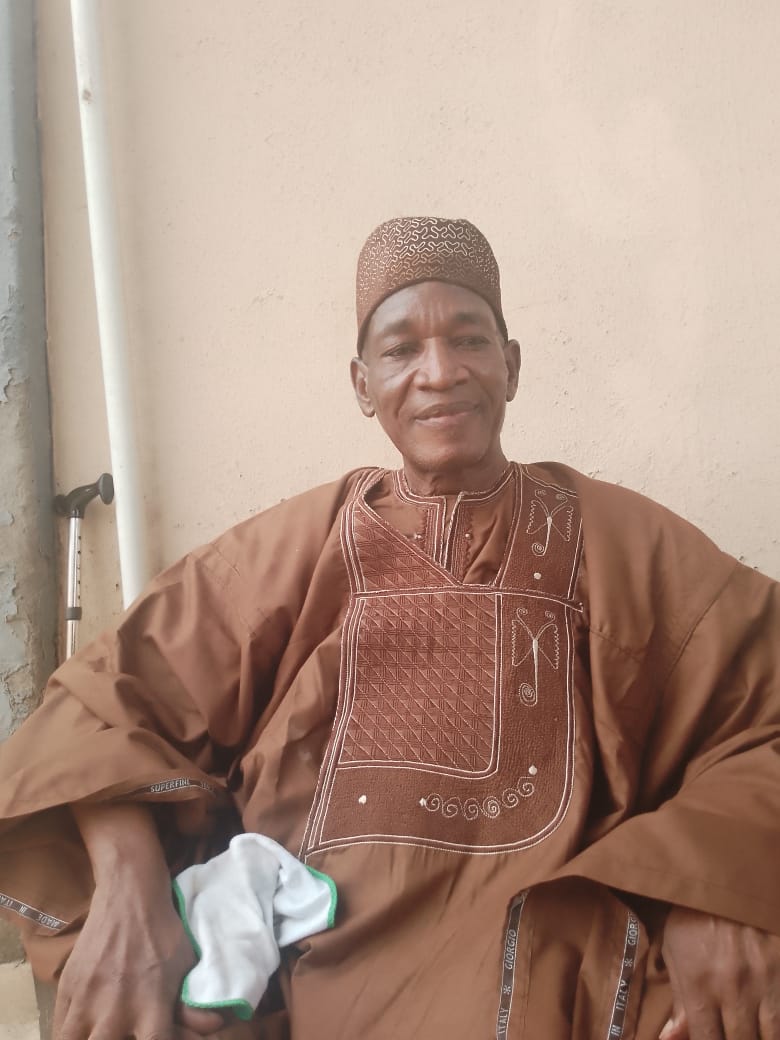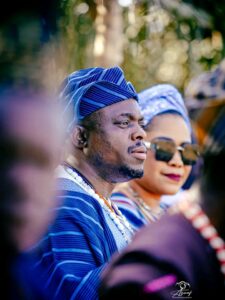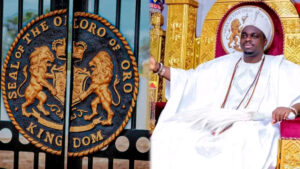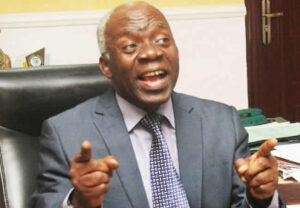
By Abdulfatai Tomori
For many sons and daughters of Offa, the song “Ofa oo, Aye le Ofa oo” is more than a melody; it’s a profound reminder of home and a bridge connecting them to their heritage and the ancestors who shaped the identity of Offa. This anthem, carrying deep emotional resonance, instils a sense of pride and belonging in those who hold Offa dear, even when they are far from its soil. Yet, it’s disheartening to note that the name behind this cherished anthem, Pa Ahmed ‘Bade Olaoye, remains largely unknown to many, especially among younger generations. This generational disconnect became apparent earlier this year when, in the Offa Historical WhatsApp Forum, a question surfaced about the anthem’s composer. When I mentioned Pa Olaoye’s name, I was met with disbelief—only after other group members, such as our erudite Boda Itafa Olaboye, intervened did the individual accept the truth. This scepticism reveals an unfortunate reality: our history, our identity, and the stories that define our heritage are not being adequately preserved or taught, especially within our schools.
Driven by this awareness, I engaged in a conversation with my brother and respected historian, Historian Muhammad Musiliyu Lawal, about honouring our heroes. He totally agreed and recounted his own efforts, particularly in regards to recognising Pa Olaoye at a previous Ijakadi Festival. Together, we decided to arrange a visit to Pa Olaoye, and after amicable arrangements, we set a date to visit him at his residence along Ikotun Road, near the popular Rondo house. My connection with Pa Olaoye dates back to my childhood. Our families have been close friends for many years, as his parents, Alhaji Yusufu Ajibade Olaoye from the Ojomudoyin compound and Alhaja Sifawu Morolayo Olaoye from the Agbopa compound, once lived alongside my parents in Ilaro. His first wife, Aunty Wulaimot (Iya Jide), is actually my maternal aunt. Pa Olaoye was also a classmate of one of my fathers, Alhaji AbdulRaufu Tomori, at Offa Grammar School. This long-standing relationship between our families has fostered a deep bond that continues to endure.
Despite this familiarity, I only discovered he was the composer of the Offa anthem when I came across the information in Professor Oyawoye’s biography, Path to Destiny. Surprised and excited by this revelation, I immediately contacted his son, my good aburo, Dr. Abdulmutolib Olajide Olaoye—who recently earned his PhD from a university in Malaysia—and he confirmed it. Since then, I have felt a deep and sincere desire to honour Pa Olaoye and celebrate his contributions in any way I can. I cannot help but feel a sense of fulfillment as I reflect on my decision to visit him along with Historian Lawal. I am also grateful to Almighty Allah for the opportunity to put him in the spotlight through my work. Upon our arrival at his house, I quickly realized that introductions were unnecessary. The moment he heard my name, he immediately recognized it and began asking about my two dadies, Raufu and Razaq Tomori. He even inquired about the children of my late sister, Moji.
This familiarity and warmth made our arrival feel like a family reunion, setting the tone for what would become a profoundly enriching encounter. As we shared the purpose of our visit, Pa Olaoye’s delight was evident, and this opened the way for a heartfelt and enlightening discussion that spanned numerous topics. Our conversation was so engaging and insightful that it quickly became clear one meeting alone could not encompass the wealth of knowledge he held. His stories, memories, and reflections were invaluable, and we realized that a follow-up meeting would be essential to truly honour and capture the depth of his remarkable journey.
In our sessions with Pa Olaoye, we delved deeply into his life, uncovering the creative journey and inspiration behind the Offa anthem. The insights he shared were rare and enlightening, bringing us closer not only to his work but also to the spirit and history of Offa itself. This experience highlighted the urgent need to bridge generational gaps that risk severing our connection to such priceless aspects of our heritage. Pa Olaoye shared that it was in 1971 when he composed what would become a cultural pillar for Offa, an anthem capturing the town’s essence, rich heritage, and unwavering unity. Although he remains largely uncelebrated in modern discourse, his work has quietly yet profoundly shaped Offa’s cultural identity, embedding his legacy into the fabric of the town’s heritage.
His story—and the story of the anthem—deserve to be widely known, for they reflect the very heart of Offa: its pride, history, and the powerful bonds that unite its people across generations.
Anthems, whether national or communal, hold a unique power as symbols of identity, history, and shared pride, and Offa’s anthem, Orin Offa, beautifully embodies these qualities. For every native son and daughter of Offa, the anthem serves as a powerful vessel, carrying within it the core values and enduring spirit of the community. Through its verses, Orin Offa captures and preserves these qualities, bridging generations and reinforcing a collective pride in Offa’s accomplishments and vibrant history. When sung at gatherings, celebrations, and special occasions, Orin Offa serves as a living connection, uniting Offa’s present with its past and fostering the spirit of community for generations to come.
Pa Olaoye’s contribution to this anthem is foundational, though his role often goes unrecognised. A deeply rooted in its traditions, history, and cultural values, Olaoye’s bond with his home town inspired him to capture its essence in song. Driven by a profound love for Offa, he composed the anthem with careful attention to the town’s stories, struggles, and triumphs, crafting lyrics and melody that reflect pride in Offa’s heritage, resilience in adversity, and a vision of hope for the future. Pa Olaoye saw the anthem as more than a song; he envisioned it as a unifying force that would celebrate the values connecting Offa’s people—loyalty, strength, and a shared sense of purpose. In an age where traditional values are sometimes overshadowed, the anthem serves as a beacon, reminding Offa’s people of their roots and the importance of safeguarding their cultural legacy.
Pa Olaoye was born on March 4, 1948, in Barkin-Ladi, located near Jos in Plateau State. His educational journey began at Iyeru Okin Primary School in Offa. He later attended Odo-Otin Grammar School in Okuku and continued his studies at Essie-Iludun Grammar School. He ultimately completed his secondary education at Offa Grammar School. Pa Olaoye is an alumnus of the University of Ilorin. His journey as a dramatist and artist took root as early as 1966 when he led the Drama Society at Offa Grammar School as its President. This early involvement in drama and the arts laid the foundation for his lifelong passion and contributions to Nigerian culture. During this time, he and the Drama Society honoured the school’s retiring principal, Mr. J.A. Osanyin, by staging a play titled ‘Ile Labo-Sinmi Oko,’ which Olaoye himself wrote. In 1969, his play earned a spotlight at the Kwara State Government House, marking a milestone for both the production and Offa Grammar School. This performance brought significant recognition to the school, along with a monetary award, solidifying Olaoye’s reputation as a talented playwright and director. His skill in crafting compelling narratives and his finesse in direction captivated audiences, establishing him as a respected figure in Nigerian theatre.
Building on the success of his previous work, Olaoye went on to write ‘Ijakadi Loro Offa,’ a play meticulously crafted to celebrate and illuminate the traditional values and rich cultural heritage of Offa.
Through its profound themes and engaging storytelling, the play resonated deeply with audiences and garnered widespread acclaim. Recognizing the cultural significance of Olaoye’s contributions, the Offa Descendant Union (ODU) invited the Drama Society to perform the play in various cities across Nigeria, including Gusau, Ibadan, Minna, and Kaduna. This exposure not only amplified Offa Grammar School’s visibility but also fostered a vibrant cultural exchange, enhancing the school’s standing in the arts and underscoring Offa’s pride in its heritage.
The success of the Drama Society was the result of not only Olaoye’s vision but also the commitment of a dedicated team whose passion and talents propelled the group to new heights. Philip Jemiloh, the dynamic Vice President, inspired fellow performers and brought a contagious energy that invigorated the society. Mulikat Oyeyemi, also a Vice President, ensured diverse representation within the leadership, adding her unique perspective to the group’s vision. Secretary Wahab Balogun played an essential role in organizing and ensuring smooth communication, while Financial Secretaries Adisa Balogun and Iyabo Olaoye managed the society’s finances with transparency and accountability. Co-Producers Rahim K. Omolosho (d. 2024), Funke Shofoluwe, and Michael Obaoye worked together to enrich the theatrical experience, emphasizing the importance of teamwork in the creative process.
The Drama Society under Olaoye’s leadership presented a diverse repertoire of plays in both English and Yoruba, including classics like Dr. Faustus and Julius Caesar, as well as culturally significant works like ‘Ile Labo-Sinmi Oko,’ ‘Aimasiko Lohundamu Eda,’ and ‘Igbehin Adun.’ These productions brought both local and universal themes to life, captivating audiences from across Kwara State and beyond. Ile Labo-Sinmi Oko was notably staged to honour the retirement of Mr. J. A. Osanyin, and Igbehin Adun was re-staged to mark the school’s Silver Jubilee, underscoring the society’s dedication to commemorating significant moments in the community’s history.
In the years that followed, the Drama Society continued to develop new productions, enriching Offa’s cultural landscape and cementing its reputation as a beacon of artistic expression. Through their efforts, Olaoye and his team not only showcased their considerable talents but also made enduring contributions to the community’s cultural heritage. Their work ensured that the arts would remain a vibrant and integral part of life at Offa Grammar School, inspiring future generations to appreciate and uphold the legacy of creativity and tradition.
Recognizing Olaoye’s talents, the late Olofa of Offa, Oba Mustapha Olawore Olanipekun Ariwajoye II, invited him to produce a play and dance drama for his coronation on October 8, 1971. Impressed by the profound impact of Olaoye’s work, Oba Olawore later entrusted him with the task of composing an anthem that would encapsulate Offa’s pride and unity. As a reference, the Olofa provided Olaoye with a copy of the Ogbomosho anthem, giving him a starting point to create something uniquely resonant for Offa. Drawing on his experience with Ijakadi Loro Offa and his deep connection to Offa’s cultural heritage, Olaoye crafted an anthem that celebrated the town’s enduring values, rich history, and aspirations, creating a legacy that would continue to inspire pride and unity among the people of Offa for generations.
Although Pa Olaoye composed Offa’s anthem in 1971, its journey to recognition was delayed by religious, socio-political tensions, and rivalries within the town. For two decades, the anthem remained dormant. However, between 1992 and 1996, Professor Jimoh Mosobalaje Oyawoye, then President of the Offa Descendant Union (ODU), championed its revival. Recognizing its importance as a cultural symbol, Prof. Oyawoye presented the anthem to the ODU Executive Committee, who unanimously embraced it as Offa’s official “national song.” At the Annual General Meeting, the anthem’s adoption was met with overwhelming support, resonating with a community eager to celebrate its heritage. To ensure the anthem reached Offa descendants nationwide, Prof. Oyawoye enlisted Alhaja B.T. Dolapo and other women to record it on cassette, distributing copies to ODU branches across Nigeria.
Pa Olaoye’s anthem will forever be etched in the history of Offa, as it serves as a significant symbol of the town’s togetherness, pride, and cultural identity. As a retired Director of Student Affairs at the Federal Polytechnic, Offa, Olaoye’s contribution may not have been widely celebrated, but it has left an undeniable mark on the community. His anthem unites the sons and daughters of Offa and instills a sense of shared purpose, fostering a deep sense of belonging and honoring the town’s rich heritage. Through his work, Olaoye reminds us that even the smallest of contributions can have a lasting impact, shaping the legacy of a community for generations to come. Today, his anthem continues to resonate in the voices and hearts of Offa’s people, inspiring future generations to embrace their roots and uphold the values and traditions that make Offa a unique and cherished place.
The labour of our heroes past…
The enduring phrase from stanza five of Nigeria’s former National Anthem, “The labour of our heroes past shall never be in vain,” transcends mere national sentiment. It serves as a profound reminder to honour the tireless efforts of those whose contributions have left an indelible mark on their communities—one such community being Offa. The remarkable achievements of Offa’s pioneers resonate deeply with the spirit of this anthem. These visionary individuals have significantly impacted the educational, healthcare, and professional spheres of Kwara State, and by extension, Nigeria. Their legacies continue to inspire and serve as a beacon for future generations, urging them to build on the solid foundations laid by these trailblazers.
The history of Offa is a vibrant tapestry, interwoven with the resilience, vision, and sacrifices of countless remarkable individuals who have profoundly shaped the town’s development. These unsung heroes, such as the Offa anthem hero Pa Ahmed Olaoye, along with many others, have collectively laid a strong foundation upon which future generations continue to build. Notable figures such as Alhaji Sanni Giwa Ilesanmi, Alhaji Gbadamosi Ijaya, Alhaji Bello Jatto, Alhaji Aliyu Olatinwo, Pa J. Olatunji, Pa John Alao Opaleke, and Pa Amos Bilewu have made significant contributions to the growth and development of Offa. Pa Amos Bilewu, in particular, played a critical role as a foundational member of the Offa Descendants Union (ODU), serving as its inaugural National President before the union’s first convention on May 18, 1937.
This historic event also saw the election of Pa Williams A. Adedoyin as the ODU’s first National Executive President, effectively marking the start of a formalized initiative dedicated to advancing the legacy of Offa.
These leaders have fostered cultural values that remain a source of inspiration for Offa’s youth, encouraging them to uphold the ideals of community and progress. People like Reverend J. Olafimihan, who documented Offa’s history in Iwe Itan Offa, have preserved the town’s heritage for posterity. Meanwhile, Chief J. S. Olawoyin, widely respected as the “Lion of the People of Offa,” and Justice Adesiyun have exemplified leadership, integrity, and justice. Through their achievements, they have established a legacy that reinforces the spirit and unity of Offa, preserving its rich cultural heritage and motivating future generations to honour and expand upon their contributions. Other noteworthy individual are Chief (HE) J. A. O. Shittu, the former Deputy Governor of Kwara State, and Pa Moradeyo Dolapo, who supported community education initiatives.
Additionally, people like Alhaji Sanni Aba Balogun, Pa Ayo Opadokun, and all former ODU presidents have made major contributions to Offa’s progress.
Their enduring influence has cemented Offa’s role in national progress and established a legacy of resilience, cultural pride, and communal service that shapes Offa’s present and continually inspires its future. The contributions of these distinguished Offa leaders span multiple fields—including education, healthcare, architecture, and community service—leaving lasting legacies that promote unity, pride, and a deep sense of identity among the people. In an effort to recognize and document the transformative impact of these trailblazers, my friend and partner, Lukman Afolabi, recently compiled a list of notable Offa figures whose lives and achievements embody the town’s spirit.
Among them is Augustus Bandele Oyediran, the first university graduate from Kwara State, who set a pioneering example in academia and intellectual pursuit, and Dr. J. D. Soleye, the first Kwara-born medical doctor, who brought honour to Offa’s professional legacy in medicine. These individuals stand as symbols of Offa’s rich heritage and accomplishments, laying a foundation that continues to inspire future generations to strive for excellence and make meaningful contributions to their communities.
The ranks of Offa’s pioneers also feature Chief Mrs. Felicia Adeola Adesiyun, founder of Kwara State’s first private nursery and primary school and the state’s first female commissioner. Individuals like Professor M. O. Oyawoye, Africa’s first professor of geology, and Chief Emmanuel O. Adesoye, the first chartered quantity surveyor from Northern Nigeria, further underscore Offa’s contributions to national development. Notably, Offa produced Kwara State’s first certified accountants, Samuel Onawola and Yunus Abioye Oyeleke, both of whom qualified just six months apart in 1965.
Additionally, Architect Oba Obayemi Bilewu became the first certified architect from Northern Nigeria, and Alhaja Mulikat Bola Jaiyeola broke new ground as the first female permanent secretary in Kwara State in the early 1980s.
In healthcare, Offa has produced trailblazers like Dr. Tajudeen Bola Olaosebikan, who published Nigeria’s first healthcare magazine, and Chief Mrs. Julianah Ayo Akinwande, who established the first private maternity home in Northern Nigeria. Alhaja Raliat Oyenike Sanni, the first female university graduate from Kwara State, and Dr. Mrs. Mojirade Ogunlewe, the state’s first female medical doctor, have further contributed to shaping Kwara’s healthcare landscape, demonstrating the vital roles that women from Offa have played in advancing health services and education in the country. These heroes, through their pioneering achievements and steadfast dedication, have elevated Offa while also influencing the broader development of Kwara State and Nigeria as a whole. Much like Nigeria’s independence leaders, they exemplify the transformative power of sacrifice, determination, and vision in building a community and shaping a nation’s future.
I fully support the recent call by Hon. Dr. Hassan Oyeleke, a former Chairman of Offa Local Government and Majority Leader in the 9th Kwara State House of Assembly, urging the National ODU Executives to establish an award that honours individuals, both living and deceased, who have made significant contributions to Offa’s development. Such an initiative would ensure that the achievements of Offa’s trailblazers are preserved, celebrating the enduring legacies of both present heroes and those who have passed. This recognition would not only honour their lasting impact but also inspire future generations to build upon the strong foundations they laid, reinforcing that their sacrifices and dedication will be remembered and valued for years to come.
Abdulfatai is a freelance researcher, writer, biographer, and history enthusiast.









